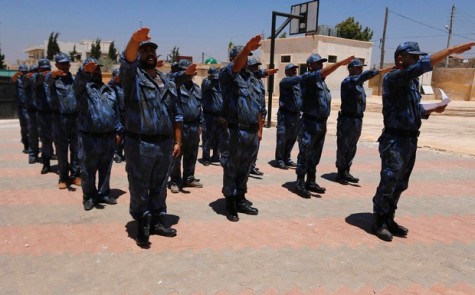PHOTO: Free Syrian Army police train in Jibreen in Aleppo Province, July 2014
Raja Abdulrahim reports for the Los Angeles Times:
Thee informant began to beg as soon as he was pulled from the police truck, which was painted hot pink, blue and black in a poor attempt at military camouflage.
“Where are their places?” officer Abdullah Waisi demanded, holding four arrest warrants for the suspects sought.
In the safety of the police station the accused thief had been willing to give up his fellow criminals. But taken along by heavily armed officers to this busy cobblestone street in the historic Bab al Hadid neighborhood of Aleppo’s Old City, he was clearly scared.
“I don’t know, I don’t know,” the man whined, holding his head and cowering as an officer grabbed him by the arm. Around them militia police fanned out, rifles aimed at a five-story building, ready to raid one of the apartments.
“It’s not perfect, but God willing it is a good beginning,” Ahmad Istaini, a former factory worker turned rebel turned police commander, said of the nascent force at work in opposition-held Aleppo.
Not long after Syrian opposition fighters began seizing control of entire neighborhoods and towns, they established administrative councils and courts to impose a measure of order in lawless locales. Of late they have begun forming civilian police forces as the latest step in creating a civil society even as the Syrian conflict drags on into a fourth year.
The policing efforts face some of the same shortcomings that have beset the fragmented opposition’s attempts at self-government: lack of experience and funds, questions of legitimacy and conflicts between competing rebel groups.
But as one man involved in Aleppo’s law enforcement noted, “If we disappeared for 10 days, Aleppo would become a jungle.”
The large swaths of Syria under the control of myriad opposition factions have become fertile ground for criminals taking advantage of a law-and-order vacuum.
“These days there is no security among people, and everyone is armed and everyone is claiming they are with the [opposition] Free Syrian Army,” said Mudaar Najjar, who heads the security establishment for the rebel Islamic Front, which includes the militia police. “These are people who were originally criminals.”
Even as forces loyal to President Bashar Assad recapture key parts of the country, rebels continue their struggle for independence and self-governance in areas they control.
“We are trying to do the same work as the regime,” said Ali Abu Hussein, who heads the militia police, before quickly correcting himself: “Not like the regime, like a government. Building a country that is safe and modern.”

